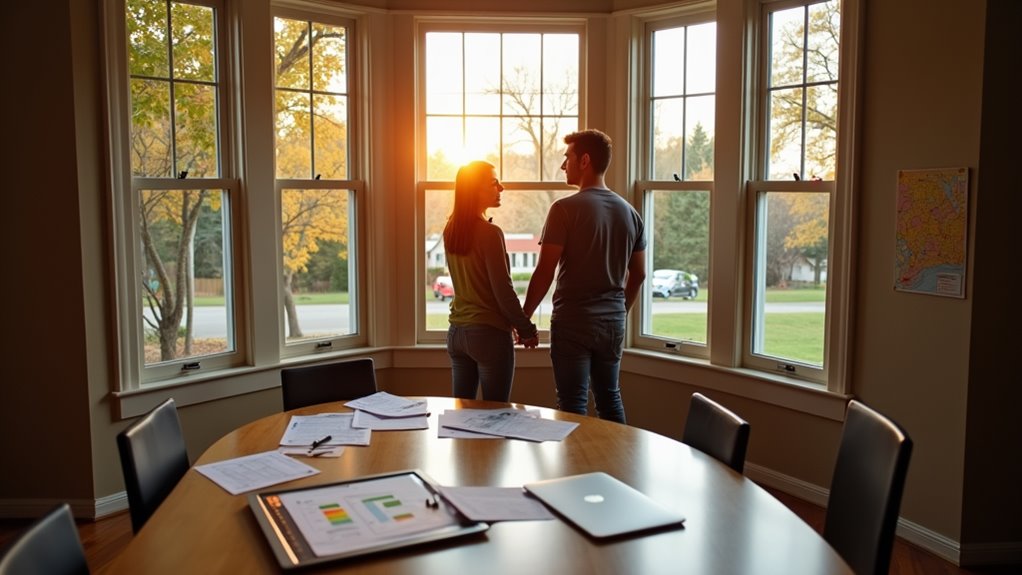You'll need to tackle several key hurdles when buying your first home. Start by building a solid down payment, typically 3.5-20% of the purchase price, while maintaining a strong credit score of at least 620 for most loans. Shop multiple lenders to secure competitive mortgage rates and understand various loan options. Don't forget closing costs, which can range from 2-5% of the price. Research neighborhoods thoroughly, considering factors like commute times and school districts. When you find the right property, craft a competitive offer and get a thorough home inspection. The path to homeownership becomes clearer as you master each step of the process.
Key Takeaways
- Save for down payment and closing costs, typically ranging from 3.5-20% and 2-5% of purchase price respectively.
- Maintain a strong credit score above 620 for conventional loans to secure favorable interest rates and mortgage terms.
- Compare different mortgage options, including fixed-rate, adjustable-rate, and government-backed loans to find optimal financing.
- Conduct thorough home inspections with certified professionals to identify potential issues and negotiate repairs.
- Research neighborhood characteristics, property values, and local regulations before making purchase decisions.
Building Your Down Payment

While saving for a down payment may seem daunting, it's one of the most crucial steps toward homeownership. You'll typically need between 3.5% and 20% of the home's purchase price, depending on your loan type and lender requirements.
To build your down payment fund, start by setting a clear savings goal and timeline. Create a dedicated savings account and set up automatic transfers from your paycheck. Look for areas to cut expenses, such as dining out or subscription services.
Consider picking up a side job or freelance work to boost your income. Don't overlook down payment assistance programs offered by state and local governments.
You might also explore options like gift funds from family members or borrowing from your retirement account, though carefully weigh the implications of these choices.
Understanding Credit Score Requirements
Your credit score plays a crucial role in qualifying for a mortgage, with most lenders requiring a minimum FICO score between 620 and 640 for conventional loans.
If you're seeking an FHA loan, you might qualify with a score as low as 580, though individual lenders may set higher requirements.
Your credit score directly affects your interest rate, with higher scores typically securing better rates that could save you thousands over the life of your loan.
Minimum Score by Lender
When seeking mortgage approval, different lenders enforce varying minimum credit score requirements that can significantly impact your homebuying journey.
Conventional loans typically require a minimum score of 620, while FHA loans may accept scores as low as 580 with a 3.5% down payment. If your score falls between 500-579, you'll need at least 10% down for FHA approval.
VA loans don't technically have minimum credit requirements, but most lenders prefer scores of 620 or higher.
USDA loans generally require 640+, though some lenders may accept lower scores. Jumbo loans are the most stringent, often demanding scores of 700 or higher.
You'll find better interest rates and terms as your score increases, so it's worth improving your credit before applying.
Credit Impact on Rates
Credit scores directly influence mortgage interest rates, with higher scores typically securing better rates that can save thousands over the life of a loan.
When you're shopping for a mortgage, even a small difference in your rate can significantly impact your monthly payments and total interest costs.
For example, if you have a credit score of 760 or higher, you'll likely qualify for the best available rates. Scores between 700-759 may result in slightly higher rates, while scores below 700 can lead to notably higher interest charges.
You'll find that each 20-point drop in your credit score could increase your rate by 0.25% to 0.5%. That's why it's crucial to check and improve your credit score before applying for a mortgage.
Finding the Right Mortgage

Since mortgage options can significantly impact your financial future, selecting the right loan requires careful research and consideration.
You'll need to evaluate fixed versus adjustable rates, loan terms, and down payment requirements that align with your financial goals.
Start by comparing conventional loans with government-backed options like FHA, VA, or USDA mortgages. Each has distinct qualification criteria and benefits.
Consider how long you'll stay in the home – this helps determine if an adjustable-rate mortgage might save you money compared to a fixed rate.
Don't forget to examine additional costs like mortgage insurance, origination fees, and closing expenses.
You'll also want to get quotes from multiple lenders to ensure you're getting competitive rates and terms that match your needs.
Managing Closing Costs
Many homebuyers are caught off guard by closing costs, which typically range from 2-5% of the purchase price. These expenses include lender fees, title insurance, appraisal costs, and various administrative charges.
You'll need to factor these costs into your budget well before closing day.
You can reduce closing costs by negotiating with your lender, shopping around for services like title insurance, or asking the seller to cover a portion of the expenses.
Some lenders offer "no closing cost" mortgages, but they'll typically charge a higher interest rate to offset these fees. You can also roll closing costs into your loan amount, though this means you'll pay interest on them over time.
Request a loan estimate from multiple lenders to compare closing costs and ensure you're getting the best deal.
Choosing Your Perfect Location

Finding your ideal neighborhood involves more than just looking at house prices. You'll need to consider commute times, school districts, crime rates, and proximity to essential services like hospitals and grocery stores.
Local zoning laws and future development plans can also impact your home's long-term value.
Don't forget to evaluate the neighborhood's character and amenities. Visit the area at different times of day to assess noise levels, traffic patterns, and community activity.
Research property tax rates, HOA fees, and local ordinances that might affect your lifestyle. If you're planning to stay long-term, look into the area's economic stability and growth potential.
Consider factors like public transportation access, walkability scores, and distance to entertainment venues that match your interests.
House Hunting Strategies
Your house hunting journey should start with daily online searches to familiarize yourself with available properties and market trends.
Make sure you've established firm budget limits before viewing homes to avoid falling in love with properties outside your price range.
Start touring multiple homes early in your search process to better understand what features matter most to you and recognize good value when you see it.
Search Online First Daily
When house hunting, daily online searches should be your first strategic move in today's competitive real estate market.
Set up alerts on major real estate websites like Zillow, Redfin, and Realtor.com to notify you instantly when new listings match your criteria. You'll want to monitor price changes, new listings, and pending sales in your target neighborhoods.
Don't limit yourself to just one platform – each site may have different listings or updated information at various times.
Make sure you're checking property details, viewing photos, and studying virtual tours first thing each morning. This routine helps you spot promising homes quickly and allows you to contact your realtor immediately about properties that interest you before they're snapped up by other buyers.
Set Clear Budget Parameters
Establishing three core budget parameters forms the foundation of a successful house hunt: your maximum purchase price, monthly payment ceiling, and estimated additional costs.
You'll need to calculate your maximum purchase price based on your down payment and loan approval amount. Then, determine your monthly payment ceiling by factoring in your mortgage, taxes, insurance, and HOA fees if applicable.
Don't forget to account for additional costs like home maintenance, utilities, moving expenses, and closing costs. These can add up to thousands of dollars beyond the purchase price.
Make sure you've got enough savings to cover both expected and unexpected expenses. By setting these clear financial boundaries before you start viewing homes, you'll avoid wasting time on properties that could strain your budget.
Tour Multiple Properties Early
Starting the house-hunting process early allows you to tour numerous properties and develop a keen eye for value.
You'll learn to spot red flags, recognize quality finishes, and understand what features truly matter to you. By viewing multiple homes before you're ready to buy, you'll gain confidence in assessing fair market prices in different neighborhoods.
Take photos and detailed notes during each tour to help you remember specific features and compare properties later.
Don't limit yourself to homes that perfectly match your criteria – viewing properties slightly above and below your target price range will sharpen your understanding of the local market.
Consider visiting open houses even if you're not immediately ready to purchase, as this experience will make you a more informed buyer when the time comes.
Making Competitive Offers

To stand out in today's competitive housing market, you'll need to craft an offer that captures the seller's attention while protecting your interests. Start by researching recent sales of comparable properties to determine a fair yet competitive price.
Consider limiting contingencies, but don't waive critical protections like home inspections. Include a strong earnest money deposit to show you're serious, and consider escalation clauses that automatically increase your bid up to a set limit.
If possible, offer flexibility on the closing date to accommodate the seller's timeline. A pre-approval letter from your lender strengthens your position, showing you're financially prepared.
Writing a personal letter to the seller can sometimes help, but focus on the property rather than emotional appeals.
Home Inspection Essentials
While making a competitive offer is crucial, scheduling a comprehensive home inspection is equally important to protect your investment.
You'll want to hire a certified inspector who'll examine the property's structural components, electrical systems, plumbing, roof, foundation, and HVAC units.
During the inspection, you should attend and take detailed notes. Ask questions about potential issues and maintenance requirements.
Your inspector will provide a written report highlighting both major concerns and minor defects. Use this report to negotiate repairs with the seller or adjust your offer price if necessary.
Don't skip critical specialized inspections like radon testing, pest inspection, or mold assessment if they're relevant to your area.
These additional evaluations can reveal hidden problems that could cost thousands to fix later.
Frequently Asked Questions
What Happens if My Home Value Decreases After Purchase?
If your home value decreases after purchase, you'll experience what's called negative equity or being "underwater" – when you owe more than your home is worth.
This can limit your ability to refinance or sell without bringing cash to closing.
You can protect yourself by making a larger down payment, keeping up with maintenance, and staying in the home long-term while the market recovers.
How Long Should I Plan to Live in a Home Before Buying?
You've probably heard the five-year rule for homeownership, but it's not that simple.
Your timeline should align with your personal goals and local market conditions. Generally, you'll want to stay 3-7 years to offset buying costs and build equity.
Consider your job stability, relationship status, and future plans. The longer you stay, the more likely you'll recoup your investment and benefit from potential appreciation.
Can I Buy a House With a Co-Signer Who Won't Live There?
Yes, you can buy a house with a co-signer who won't live there.
Your co-signer will share legal responsibility for the mortgage but doesn't need to occupy the home. They'll help you qualify for the loan by adding their income and credit profile to your application.
Remember that your co-signer becomes equally liable for payments, so you'll both need to understand and accept the financial commitment.
What Insurance Policies Do I Need Besides Standard Homeowner's Insurance?
Want to make sure you're fully protected as a homeowner?
Beyond standard homeowner's insurance, you'll need private mortgage insurance (PMI) if your down payment is less than 20%.
Consider flood insurance if you're in a flood-prone area, and umbrella liability insurance for extra protection.
You might also want title insurance to protect against ownership disputes, and earthquake coverage if you're in a seismic zone.
How Do Homeowner Association Fees Affect My Monthly Housing Expenses?
HOA fees will increase your monthly housing costs beyond your mortgage payment.
You'll pay these recurring fees to cover community amenities, maintenance, and services like landscaping, security, or pool upkeep.
The fees vary widely, from $100 to over $1,000 monthly, depending on your location and included services.
Remember to factor these fees into your budget when calculating total housing expenses you can afford.
Conclusion
You're now equipped to tackle the complex journey of buying your first home. With a clear understanding of down payments, mortgages, and the inspection process, you can join the 65% of Americans who've achieved homeownership. Whether you're building your savings, improving your credit score, or searching for the perfect neighborhood, stay focused on your goal. The path may be challenging, but the reward of homeownership is worth every step.

Leave a Reply